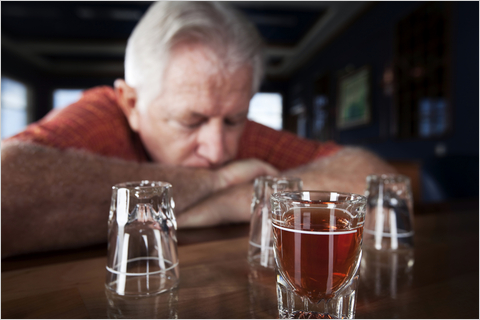Beware of alcohol, seniors.
Your defenses are down.
Nobody seems to have noticed, but the old folks are having trouble with alcohol, and it’s time we did something about it.
 That was the word I got when I interviewed Dr. David Lipschitz, author and one time chairman of the geriatrics department at the University of Arkansas for Medical Sciences College of Medicine five or six years ago. I thought he was on to something then, and I still think so.
That was the word I got when I interviewed Dr. David Lipschitz, author and one time chairman of the geriatrics department at the University of Arkansas for Medical Sciences College of Medicine five or six years ago. I thought he was on to something then, and I still think so.
“Substance-related disorders of all types remain overlooked in geriatric patients,” Dr. Lipschitz said in our interview, and by that he meant overlooked by both the patients and the doctors who weren’t dealing with it as effectively as they might have with potentially dire effects.
Chronic abusers of alcohol, he said, may face: alcoholic cardiomyopathy or severe damage to the heart; psychiatric disorders, including Korsakov’s psychosis and destruction of intellectual functioning; damage to the cerebellum and spinal cord leading to weakness, severe leg pains and problems with gait and balance; cirrhosis; gastrointestinal bleeding; severe nutritional deficiencies; and bone marrow damage.
All of these ailments are incredibly painful to endure and most are potentially fatal.
In his column, Dr. Lipschitz described what one of his elderly patients was going through.
“I recently saw a patient who had significant memory loss, problems with gait and balance, a tremor and severe heart problems. His heart rhythm was irregular and cardiac catheterization done elsewhere showed that he did not have any coronary artery disease.
“The patient admitted to having 4 ounces of alcohol daily. However, his wife stated that he had that much by lunchtime and more during the rest of the day. Even worse, as he had gotten older, alcohol changed his personality and he readily became angry.
“Alcohol was killing this man and was the main cause of his memory loss, his inability to walk and his heart problems.
Alcoholism in the Elderly
One of Dr. Lipschitz’s major sources in his study of alcoholism was a scientific paper on “Alcoholism in the Elderly” written by Dr. James W. Campbell, a Cleveland geriatrics specialist.
Campbell begins with a statement of the problem.
“Alcoholism is a high prevalence illness in older populations,” Dr. Campbell says, citing the fact that 14 percent of the senior citizens who show up in emergency rooms “have diagnosable alcoholism.”
He adds, “alcohol use significant enough to impair health is present in up to twenty percent of patients hospitalized on medical-surgical units.”
An interesting sidebar to his findings is that women get into the sauce just about as much as men. It’s just that the ladies haven’t been diagnosed.
“Older women represent the most under-diagnosed population,” Dr. Campbell says. “Twelve percent of older women drink to excess, and older women have a swifter progression to alcohol-related issues.”
So why are the elderly–both men and women–running into problems?
Part of it has to do with the season of life. The fact that they are getting on in years provides many with new reasons to drink and also greater opportunity.
Many seniors–women and men–do most of their drinking behind closed doors, and when they drink too much fewer people notice.
They are retired from their jobs, their kids are grown up and gone, they aren’t committing violent crimes, and except perhaps for an irate spouse, things are fairly quiet.
At the same time, there are new stresses–financial, health, loss–in their lives. The author of the phrase, “old age ain’t for sissies” knew what he was talking about.
Still every age has its stresses.
The main thing is physical change
What’s really at the heart of the matter are the physical changes the elderly are going through–changes in metabolism and in the body-fat-to-body-water ratio and reductions in the size of key organs like the liver and kidney.
The result is that a standard dose of alcohol produces a much higher blood alcohol concentration in an older person than a younger person of the same weight.
For physical reasons, they just can’t handle alcohol like they used to.
Okay, some will say, that’s understandable, but how about if I just cut back?
Maybe. But cutting back is hard to maintain, and, besides any quantity of alcohol could be harmful.
There is debate regarding the beneficial effects of low-dose drinking, and Dr. Campbell comes down on the side of abstinence.
“In younger persons,” he says, “low-dose controlled alcohol may improve cardiovascular risk factors. No clear evidence exists of benefits from drinking for elders. On the contrary, many diseases and medications used by the elderly have contraindications to alcohol use.”
Dr. Campbell adds that “Interactions between alcohol and prescription and over-the-counter (OTC) medications are potentially serious problems, especially in older persons.”
The best solution for the elderly is to quit.
Recovery is attainable
For most this will not be a problem. The alcoholic will find it more difficult, but combined with a message of hope, recovery is definitely attainable.
Furthermore, the physical and emotional damage the patients have sustained can often be arrested and in some cases reversed.
Seniors have an edge when it comes to getting well. Dr. Campbell says, “Alcoholism is treated successfully at all ages, and success rates are actually greater in older populations.”
The use of a screen to identify alcohol problems with patients in an emergency room followed by a brief intervention with family involvement and program of recovery such as Alcoholics Anonymous has been proven successful, Dr. Campbell says.
“The standard sobriety prescription includes these three steps: discontinue all substance abuse; attend 90 meetings in 90 days; and become active in a long-term program and attend meetings regularly.
Dr. Campbell continues, “AA is readily available and can be applied for any substance abuse disorder. Formal research on AA is by definition difficult, however, studies have shown attendance at 90 meetings in the first 90 days to be the most powerful predictor of long-term sobriety.
“AA is senior appropriate, and a third of all calls to AA are from persons over age 55. In contrast to classic theory a non judgmental approach without labeling appears to be more effective in older persons.”
This approach offers many positive benefits. Those who do abstain and attend 12-Step meetings often discover a host of new friends and healthier ways of dealing with life’s problems.
Other potentially fatal diseases don’t offer terms as attractive as these, many point out.
“If a doctor told a patient he could cure his pancreatic cancer by going to meetings and following a 12-Step program, he would jump at it,” one AA member observed.





Leave a Reply